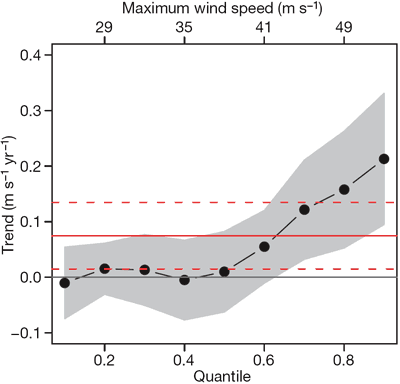The link between hurricanes and global warming
Posted on 9 September 2008 by John Cook
With an intense 2008 hurricane season, the link between hurricanes and global warming is once again in the spotlight. Does climate change have any effect on hurricanes? Or is the recent rash of hurricanes a biproduct of the same chaotic weather that spewed out Hurricane Katrina in 2005 followed by a quiet season the following year. A new paper published in Nature, The increasing intensity of the strongest tropical cyclones (Elsner et al 2008) addresses this question.
Hurricanes have already been observed to be increasing in intensity in the North Atlantic (Emanual 2005). However, Elsner extends this to each ocean basin using global satellite data, looking for any trend in wind speed since 1981. Figure 1 plots the long term trend of maximum wind speed (eg - whether hurricanes are getting stronger or weaker) against different strength hurricanes. This tells us not only whether hurricanes are overall getting stronger but also how different strength hurricanes are being affected.

Figure 1: Trends in tropical cyclone maximum wind speeds by quantile, from 0.1 to 0.9 in increments of 0.1. The point-wise 90% confidence band is shown in grey. The solid red line is the overall trend and the dashed red lines delineate the 90% point-wise confidence band about this trend.
Overall, there is a statistically significant upward trend (the horizontal red line). But more significantly, Elsner found weaker hurricanes showed little to no trend while stronger hurricanes showed a greater upward trend. In other words, stronger hurricanes are getting stronger.
While Elsner found no trend in the overall number of hurricanes, the increasing intensity means there are an increasing number of storms with a maximum wind speed exceeding 210 kilometres per hour (category 4 and 5 storms). The inevitable conclusion is that as sea temperatures continue to rise, the number of Category 4 and 5 hurricanes hitting land will inexorably increase. That coupled with rising sea levels is a bleak prospect.































 Arguments
Arguments























 0
0  0
0






Comments